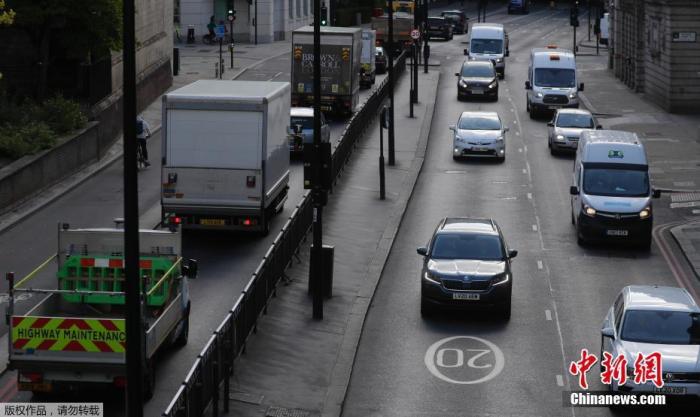British public health officials said on the 13th that a new coronavirus serum antibody test reagent developed by Swiss Roche Holding Company showed "high specificity" in the evaluation, and the positive accuracy rate was as high as "100%".
The British government has always wanted to find a reliable antibody detection reagent to determine the extent of the spread of the new coronavirus in China, and provide a basis for anti-epidemic decisions.
Data map: May 11, local time, the traffic on the highway during the morning rush hour in London, England.
[Government "Endorsement"]
John Newton, coordinator of the National New Coronavirus Testing Project, said that the Public Health Authority of England conducted an independent assessment last week, confirming that the reagents developed by Roche are reliable. "This is a very positive development, because highly specific antibody detection can reliably mark past viral infections."
Unlike a nasopharyngeal swab test that directly looks for the presence of new coronavirus in the body, a serum test looks for antibodies produced by the body due to infection with the new coronavirus.
Newton emphasized that for the time being, it is impossible to judge how immune the human body is from the positive results of antibody tests. But according to the British "Times", some experts believe that patients who have been infected with the new coronavirus and recovered may be immune to the virus within two to three years.
Reuters reported that Roche issued a statement on the evening of the 13th, confirming that it is negotiating with the British National Medical and Health Institutions and the Government and is committed to promoting Roche antibody detection reagents in the UK in stages as soon as possible. Roche announced that the company has the ability to supply hundreds of thousands of kits to the UK every week.
Roche's reagent was authorized by the US Food and Drug Administration for emergency use last week.
[Or help "unblock"]
The Times reported that Prime Minister Boris Johnson had previously determined that reliable antibody testing could help the British epidemic "reverse the situation", but the testing reagents ordered by the British government in mid-March failed to pass the accuracy certification. Roche's reagent claims that the specificity detection rate is 100%, which means that there will be no "false positive" phenomenon, that is, people who do not have antibodies in the body will not be falsely detected as antibody positive.
A spokesman for the Ministry of Health and Social Care told the British Sky News Channel that in the UK government ’s anti-epidemic strategy, “in addition to the large-scale improvement of nasopharyngeal swab virus detection capacity”, the promotion of antibody testing is also an important part. Announce relevant plans in due course.
British health experts believe that the promotion of antibody testing will help researchers grasp the epidemic outbreak data, provide a reference for predicting future outbreaks, and may help the development of new coronavirus vaccines and therapies.
At present, England has begun to relax the "closing city" measures, and some personnel in specific industries such as manufacturing are allowed to resume work. The antibody test results will help the British government to implement "unblocking" measures based on the development of the epidemic. The government is considering whether to issue "immune passports" to people who test positive for antibodies and lift restrictions on their travel.
According to the Times, if a large number of people have been tested to obtain certain immunity to the new coronavirus, the British "unblocking" process is expected to advance. (Ocean) (Xinhua News Agency Special Feature)

